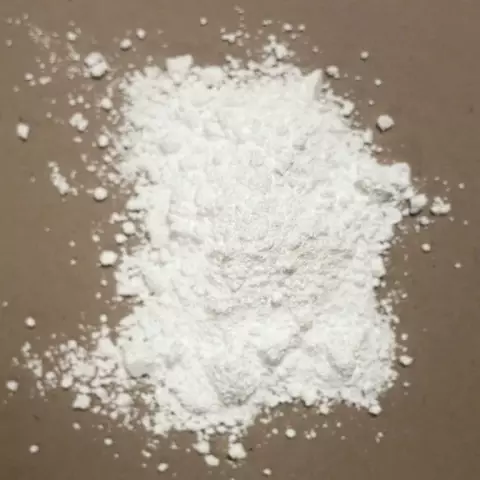- Author Rachel Wainwright wainwright@abchealthonline.com.
- Public 2023-12-15 07:39.
- Last modified 2025-11-02 20:14.
Magnesium carbonate

Magnesium carbonate (additive e504) - magnesium salt of carbonic acid, food additive of the group of emulsifiers.
Characteristic
The E504 additive looks like crystals without color and characteristic odor, practically insoluble in water and ethanol. The substance reacts well with acids, decomposing with the release of carbon dioxide. The substance begins to decompose at a temperature of at least 400 degrees Celsius.
Getting magnesium carbonate
The natural source of the E504 supplement is the minerals of magnesite, londswordite and nesvegonite.
On an industrial scale, the production of magnesium carbonate occurs by precipitation of a mixture of solutions of soda ash and magnesium sulfate.
Magnesium Carbonate Applications
It is allowed to use the additive as an agent that prevents clumping and caking of products. In Russia, in the production of chocolate and cocoa, the amount of additive is allowed up to 70 g / kg.

E504 additive is used in the food industry as an antioxidant for color preservation of finished products. E504 is widely used as an additive to table salt to avoid clumping. The substance is often added to jams, canned fruits, jams and preserves in order to thicken plant tissues and to regulate acidity. Also magnesium carbonates are components of cheeses (grated, ripe and ripe sliced cheeses).
In addition to the food industry, magnesium carbonate is used in the production of cosmetics (as a component of masks for dry and normal skin of the face), since it has a mild and astringent property. In weightlifting, powerlifting, gymnastics, rock climbing, E504 is used as a drying powder for hands. In the production of plastic, magnesium carbonate is a smoke control component. It is also added to fire extinguishing compounds, in the production of toothpaste and powder, and in the manufacture of thermal insulation materials.
The effect of magnesium carbonate on the human body
The e504 additive itself is not toxic. However, its excessive use in food can have a depressing effect on the central nervous system and cause cardiac disorders. In addition, in high concentrations, the additive acts as a laxative and causes irritation of the digestive tract and respiratory tract, and also causes allergic reactions in the form of irritation of the skin and mucous membranes.
Found a mistake in the text? Select it and press Ctrl + Enter.






